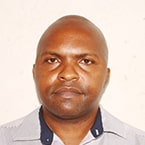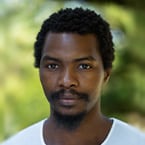Beginning Investigator Grant for Catalytic Research (BIG Cat)
BIG Cat is a premier initiative by the African Organization for Research and Training in Cancer (AORTIC) to build capacity for cancer research in Africa. The goal of BIG Cat program is to aid the next generation of African cancer researchers to base their careers in their home countries and institutions, and to contribute to the overall expansion of capacity for research and training in Africa by generating evidence that will guide practice and policy. BIG Cat was initiated in 2010 by the US National Cancer Institute Center for Global Health (NCI/CGH), and it is now a collaborative effort of AORTIC, American Association for Cancer Research (AACR), and NCI/CGH, with funding support from Partners including academic, industrial and scientific organizations.
2024 Grantees

Research
Dr. Compaore’s research seeks to address the significant burden of hepatocellular carcinoma (HCC) in Sub-Saharan Africa (SSA), where over 80% of HCC cases are linked to chronic Hepatitis B Virus (HBV) infection. While the understanding of common HBV genotypes A, B, C, and D has advanced, there is a notable gap in knowledge concerning HBV genotype E and its impact on HCC. Dr. Compaore and her team seek to uncover the genetic interplay between HBV variants and HCC using advanced genomic sequencing and bioinformatics analysis. Her research seeks to improve diagnostic precision and therapeutic efficacy, offering new insights that could advance scientific understanding and make a meaningful difference in the lives of those affected by HBV-related HCC in SSA, contributing to global health equity and improved quality of life for this vulnerable population.
Biography
Dr. Compaore holds a bachelor’s degree in biological sciences from the University of Houston-Clear Lake, a master’s degree in infectious disease and microbiology from the University of Pittsburgh, and a doctorate in molecular biology and virology from the University Joseph KI-ZERBO, Burkina Faso. Her current research focuses on hepatopancreatobiliary cancers induced by viral hepatitis (HBV, HCV), with a particular focus on biomarker development for the early detection of HBV-induced HCC. She is currently a senior scientist at the Institut de Recherche en Sciences de la Santé (IRSS-CNRST) in Burkina Faso.
Acknowledgment of Support
“The program is an excellent opportunity to achieve significant career enhancements. It will enable me and my team to generate data supporting the development of competitive research proposals. The program will also aid my progression towards independence as an investigator in cancer prevention through biomarkers discovery, primarily on hepatocellular carcinoma.”

Research
Infection with high-risk human papillomavirus (hrHPV) is a key risk factor of cervical cancer. Women living with HIV (WLHIV) are at an increased risk of HPV infection, and mutations in some viral genes are linked to rapid oncogenesis. However, data on circulating hrHPV and viral genome mutations in the female Nigeria population are limited. Dr. Ifeorah plans to screen 1320 Nigerian WLHIV to identify circulating hrHPV strains and their sub-lineages, as well as to define variations in E6/E7 genes. This will be done by conducting whole genome sequencing of 90 selected hrHPV positive samples and mutation analysis in the E6 and E7 proteins (HPV-16/18 only). Study outcomes will help to design HPV-DNA screening protocols tailored toward detection of locally circulating hrHPV and provide the basis for more studies on clinical/therapeutic relevance of identified mutations.
Biography
Dr. Ifeorah obtained her bachelor’s degree in medical laboratory science from the University of Nigeria Nsukka (UNN) and a Master of Science in virology from the University of Ibadan Nigeria. She is an early career investigator and trained virologist who currently holds a joint appointment as a research associate in the Centre for Translation and Implementation Research (CTAIR) and assistant professor in the Department of Medical Laboratory Sciences, at UNN. Her research focuses on understanding virus evolution and the intricate link between host and pathogens in virus-induced cancers. Her research aims to provide evidence for the development of personalized therapeutics and novel biomarkers for early and point-of-care diagnosis in Africa.
Acknowledgment of Support
“This award provides a project leadership opportunity and financial support for sharing findings through publications/conferences. This experience will boost my confidence, visibility, and skills, enhancing my potential to attract more funding and achieve research independence and leadership. Additionally, it offers an excellent opportunity to build and expand my professional relationships/networks.”

Research
The DYPD gene encodes for dihydropyrimidine dehydrogenase. This enzyme catalyzes the first and rate-limiting step of 5-fluorouracil (5-FU) degradation and is highly polymorphic. In particular, the DPYD Y186C (rs115232898) variant has been observed in people of African ancestry. Dr Mazhindu and a multidisciplinary scientific and clinical team will be conducting a safety and pharmacokinetic study of 5-FU in gastrointestinal cancers patients who are DPYD Y186C (rs115232898) variant carriers.
Biography
Dr. Mazhindu obtained his medical degree and master’s of Medicine in radiotherapy & oncology from the University of Zimbabwe before undergoing clinical research training at Stanford University. He is currently a doctoral fellow at the University of Zimbabwe/Parirenyatwa Group of Hospitals and a senior scientist at the African Institute of Biomedical Sciences & Technology (AiBST). His research under the Consortium for Genomics and Therapeutics in Africa (CGTA) focuses on African pharmacogenomic biomarker discovery, evaluation, and translation into clinical implementation. This work includes evaluating the adequacy of current pharmacogenomic biomarker treatment guidelines in African populations and improving the inclusion of African specific pharmacogenomic biomarkers. He also performs collaborative work with SPARK at Stanford University and the University of Colorado Denver to optimize drug therapy outcomes on the continent with the widest genetic diversity in the world.
Acknowledgment of Support
“I am honored to receive the 2024 Beginning Investigator Grant for Catalytic Research (BIG Cat) award from AORTIC and AACR. This grant, in addition to being an encouragement to continue on the path to being an independent researcher, also helps to validate those mentors from the University of Zimbabwe, Parirenyatwa Group of Hospitals, AiBST, University of Colorado Denver, and SPARK at Stanford who have supported me on this journey.”

Research
Although ovarian cancer (OC) is the second most common gynecologic cancer in Nigeria, there is a paucity of data on OC epidemiology, clinicopathology, genetics, and survival. OC patients with predisposing genetic mutations have a higher probability of benefiting from specific treatments. Additionally, relatives carrying such pathogenic variants can undergo risk reduction measures. Despite these benefits, genetic testing for OC is currently unavailable in tertiary health institutions in Nigeria. Dr. Mustapha aims to determine the clinicopathologic, molecular, and survival correlates of women with OC across 12 participating sites, by assessing the spectrum and variability of germline mutations across ethnolinguistic groups while correlating risk factors/conditions with clinical outcomes.
Biography
Dr. Mustapha received her medical and postgraduate degrees from Ahmadu Bello University, Zaria, Nigeria and completed her residency training at the affiliate teaching hospital. She is currently in a gynecologic oncology fellowship training program under the International Gynecologic Cancer Society/National Postgraduate Medical College of Nigeria. She is also a senior lecturer/consultant in the Gynecologic Oncology Unit, providing clinical care, teaching and research. She sits on various local and international gynecologic cancer committees and belongs to professional bodies involved with advocacy and collaborative research. She has a strong passion for improving outcomes for patients with ovarian cancer.
Acknowledgment of Support
“Receiving the 2024 BIG Cat grant is crucial for advancing my research into the clinical, pathologic, and genetic landscapes of ovarian cancers in Nigeria. This funding will enable me to explore predispositions and potentially make significant contributions to improving outcomes for patients and reducing risk in their family members.”
2023 Grantees

Research
In endemic tuberculosis (TB) areas, patients with lymphoma are frequently misdiagnosed with extrapulmonary TB, resulting in delayed treatment and excess mortality from late-stage lymphoma. Regional challenges in lymphoma diagnosis are compounded by limited access to specialized pathology services and lymph node biopsies. Dr. Antel and her research group aim to design a consolidated liquid biopsy panel to detect lymphoma from cell-free DNA (cfDNA) in peripheral blood using two approaches: first, through detection of clinically relevant genetic alterations using probes targeting recurrent somatic mutations associated with lymphomas most prevalent in Sub-Saharan Africa; and second, through a hybrid-capture approach to detect all functional VDJ genes of the immunoglobulin loci from cfDNA. The continued decline in sequencing costs make ‘liquid biopsy’ approaches increasingly attractive as flexible and tractable platforms for molecular diagnostics. A liquid biopsy to diagnose and subtype lymphoma and TB would have immediate utility in patients with difficult-to-biopsy lymphadenopathy and would have broader utility among patients suspected to have lymphoma or disseminated TB.
Biography
Dr. Antel is a South African clinical hematologist and physician-scientist, at the University of Cape Town. She leads a research group in the Institute for Infectious Disease and Molecular Medicine, focusing on the intersection of infectious disease and cancer. Her funded research projects are focused on defining and characterizing the genomic landscape and pathogenesis of HIV-associated lymphomas, and on identifying molecular methods to diagnose lymphoma and other cancers in Sub-Saharan Africa. She has a dual appointment in the Division of Medical Oncology at Dana-Farber Cancer Institute, as senior scientist where she works remotely on molecular diagnostic initiatives, and on in vitro and in vivo models of germinal center dysfunction in the context of HIV. Bringing together her deep clinical knowledge of patient needs in the context of South Africa, with her access to expertise and technology at Dana Farber Cancer Institute, she aims to develop regional molecular diagnostic capabilities and spearhead future technical innovations using cfDNA for clinical and investigative use.
Acknowledgement of Support
“I have pivoted from clinical work to molecular research. I am tremendously grateful that this award will allow me to have continued time and focus away from clinical duties to focus on a research in an area that is of very high need and has grown directly from my first-hand experience of the plight of patients diagnosed with advanced stage lymphoma who frequently experience preventable delays. This award will allow me to develop my newly established laboratory at the University of Cape Town and to continue to acquire further skills in cancer genomics, including the analysis of cfDNA. Lastly, I’m grateful for the support to continue to develop our existing collaboration with Dana Farber Cancer Institute, and I have confidence that there will be opportunities for growth and innovation at both institutions due to this collaboration.”

Research
In Mali, nearly 25% of women diagnosed with breast cancer (BC) succumb to the disease within 12 months, despite treatment. A commonly used BC drug, tamoxifen, is metabolized by cytochrome P450 (CYP450) and glutathione S-Transferase (GST)enzymes. Dr. Diakite is set to elucidate the impact of CYP450 and GST polymorphism genes on the response to tamoxifen-based treatment using AS-PCR and RT-PCR. Additionally, using NGS, he seeks to identify new biomarkers involved in tamoxifen response. This research seeks to uncover the genetic basis of differential treatment outcomes in BC, potentially leading to improved personalized therapeutic approaches and better outcomes for BC patients in Mali.
Biography
Dr. Diakite received his medical degree from the University of Bamako in 2008 before completing a university diploma course in Medical Genetics from the University of Versailles in 2009. He obtained his doctorate in Genetic and Molecular Pathology from Hassan II University, Morocco in 2015. Dr. Diakite is currently an assistant professor of Genetic and Molecular Biology at the University of Sciences, Techniques and Technologies of Bamako where he is embarking on a two-year fellowship. During this fellowship, his research will concentrate on the pharmacogenetic aspect of breast cancer. His ultimate objective is to become an independent clinical-scientist and a leader in basic research, with a focus on the molecular epidemiology, epigenetic, and pharmacogenetic aspects of breast cancer.
Acknowledgement of Support
“I am deeply honored to be awarded the Beginning Investigator Grant for Catalytic Research (BIG Cat). This grant will significantly enhance and expand research in the critical field of pharmacogenetics of breast cancer. Moreover, it provides me with the invaluable opportunity and support to establish an independent and impactful research program.”

Research
Esophageal squamous cell carcinoma (ESCC) is a major cause of mortality in Eastern Africa. Both ESCC and its asymptomatic precursor esophageal squamous dysplasia (ESD) are typically diagnosed by endoscopy. An alternative method, the Cytosponge, or “pill-on-a-string”, is being explored for its potential utility for early detection and etiologic research of ESCC/ESD. In this study, Dr. Mremi is set to administer Cytosponge to 500 high-risk individuals in Tanzania and assess acceptance rates. In addition, he plans to build a Cytosponge biobank that can be used to identify biomarkers and to conduct molecular studies.
Biography
Dr. Mremi recently completed a doctoral fellowship, where he focused on improving access to cervical cancer screening and early detection in Tanzania. He is an anatomic pathologist and head of the pathology department at Kilimanjaro Christian Medical Centre, a referral and teaching hospital in northern Tanzania. He has seven years of clinical experience. He seeks to improve access to cancer screening and diagnosis, particularly in resource-constraint settings. His research areas of interest include esophageal and women’s cancers. As a lecturer, he is extensively involved in undergraduate and postgraduate training, and the supervision of medical students in clinical research.
Acknowledgement of Support
“I would like to thank the AORTIC and AACR for this Beginning Investigator Grant for Catalytic Research (BIG Cat). I believe that the grant is an important and critical step for my career development towards becoming an independent African cancer researcher. Underrepresented researchers when funded can address unmet patient needs and inequities by building an inclusive research landscape.”

Research
The majority (~80%) of children with cancer live in low- and middle-income countries, where five-year overall survival of acute leukemia, the most common childhood malignancy, is as low as 15%. The most significant challenges in childhood acute leukemia survival in sub-Saharan Africa (SSA) include limited cancer diagnosis capacity and a lack of molecular characterization. Dr. Mzikamanda aims to integrate immunophenotype and molecular characteristics of acute leukemias to understand subtypes in Malawi, and to generate preliminary evidence on locally appropriate risk-adapted treatment protocols. He is set to: a) implement custom Nanostring gene fusion assays, b) determine the feasibility and impact of incorporating acute leukemia gene fusion testing into clinical care, and c) correlate immunophenotypic and molecular features with clinical and epidemiological features. The data he obtains can help describe the biology of acute leukemia in children in SSA and validate the applicability of current risk-adapted protocols in the region.
Biography
Dr. Mzikamanda received his medical degree from the University of Malawi College of Medicine. He completed his residency in pediatrics from the University of Malawi and the University of Pretoria in South Africa.He completed his fellowship training in the East African Pediatric Hematology-Oncology Fellowship Program. He is currently a pediatric hematologist-oncologist at the Texas Children’s Hospitals’ Global Hematology-Oncology Pediatric Excellence program in Malawi, where he translates clinical best practices into actions that positively impact children with cancer and blood disorders in Malawi. His interest is in the clinical and molecular characteristics of childhood hematological malignancies.
Acknowledgement of Support
“Accurate and timely cancer diagnoses are crucial for improving survival in sub-Saharan Africa. The Beginning Investigator Grant for Catalytic Research (BIG Cat) is a steppingstone to support my aspiration of becoming a leading clinical researcher in understanding immunological and genetic modifiers of childhood hematologic malignancies and developing clinical care programs of excellence.”
2022 grantees

Research
Non-Hodgkin Lymphomas (NHL) are a leading cause of cancer morbidity and mortality in HIV-infected patients, with Diffuse Large B Cell Lymphoma and Burkitt Lymphoma being among the most prevalent subtypes. Growing evidence supports an oncogenic role for HIV-1 and its antigens, particularly the Transactivator of transcription (Tat) protein, in lymphomagenesis. Using ChIP-Seq and whole transcriptome analysis (RNA-Seq), Dr. Rios is set to identify Tat-association sites and elucidate their potential role as a transactivator of cellular genes within the B-cell genome. In addition, they plan to determine the impact of Tat on the miRNA-targetome.
Biography
Dr. Leonardo Rios received his PhD from the University of Cape Town, where he studied the impact of HIV infection on lymphomagenesis. He showed that Tat can promote c-MYC and AICDA expression in lymphoma cells by interfering with transcriptional and posttranscriptional regulation of these oncogenes. He seeks to expand on these results during his postdoctoral work, aiming to identify the Tat interactome within B cells and to elucidate if these interactions promote lymphoma in HIV-positive patients.
Acknowledgement of Support
I am honored to receive the Beginning Investigator Grant for Catalytic Research (BIG Cat) award. This grant will enable the expansion of research in the important field of HIV-associated malignancies that affects a large portion of our population. It also provides me with the opportunity and support to start an independent research program.

Research
Breast cancer screening rates are low among women in low-and-middle-income countries, resulting in stark disparities in breast cancer burden around the world. This critical public health problem is highly relevant to Ghana where breast cancer is the leading cause of cancer deaths and only 4.5% of women have undergone screening. Dr. Mensah, along with a multidisciplinary team of independent investigators from KNUST and KATH, are set to use a mixed-methods design to understand barriers to breast cancer screening. They plan to develop a mobile phone-based app that can be used to educate women about screening for breast cancer. The study will be conducted in rural settings in Kumasi, Ghana, where a combination of barriers is likely to be responsible for the low participation in breast cancer screening.
Biography
Dr. Adwoa Bemah Boamah Mensah has a doctorate in nursing with advanced training in oncology and palliative care. Other than doctoral training in South Africa, all her academic and research training including her fellowship has been in Ghana. She is currently a senior lecturer at Kwame Nkrumah University of Science and Technology (KNUST). She has devoted her career to oncology practice, teaching, and conducting health research in urban and rural districts in northern Ghana.
Acknowledgement of Support
The 2022 BIG Cat program will expand my capacity for research and training in generating practice and policy-relevant evidence, thereby promoting and supporting me as I seek to establish a successful career path in cancer research in KNUST and Ghana. Ultimately, I will develop interventions that will potentially further the health of women.

Research
Almost all genome-wide association studies (GWASs) have been performed in Europeans or Asians despite the high incidence and mortality rates in women of African ancestry. Dr. Kamiza aims to identify genetic factors for cervical cancer in women of African ancestry, specifically from the Johannesburg Cancer Study and AWI-Gen cohort. He is also set to perform a trans-ethnic meta-analysis using publicly available summary data. Using two-sample Mendelian randomization, he also seeks to identify lifestyle factors causally associated with cervical cancer.
Biography
Dr Abram Kamiza obtained his bachelor’s degree in Medical Laboratory Science at the University of Malawi, and his MSc and PhD degrees in Genetic Epidemiology at Taipei Medical University in Taiwan. He is currently a postdoctoral researcher at the Sydney Brenner Institute for Molecular Bioscience, the University of Witwatersrand, Johannesburg, South Africa. His research interest is to identify environmental, genetic, and epigenetic factors associated with cancer development. Currently, he is working to identify genetic factors associated with cervical cancer in black South African women using genome-wide approaches.
Acknowledgement of Support
This grant is important to me, as it will provide a platform to uncover genetic variants associated with cervical cancer in women of African ancestry, develop polygenetic risk scores that may be used for targeted screening and preventative strategies and establish local, regional and international networks for future collaborations.

Research
There is emerging evidence that HPV-associated anal precancer and cancer are increasingly reported, particularly among women with history of high-risk HPV (hrHPV) infections, premalignant or cancer of the cervix, who had no history of anal sex. Dr. Morhason-Bello seeks to elucidate the mechanisms behind the detection of high-risk HPV in the anus of women that have high-risk HPV in their cervix, using biological samples collected from the Sexual Behavior and HPV infections in Nigerians in Ibadan (SHINI) study. He is set to identify potential biomarkers (using epigenome-wide association studies and gene-specific DNA methylation PCR) in women that have similar high-risk HPV in the cervix and anus. Such biomarkers could potentially be developed as a screening tool for early detection of precancer and cancer of the anus.
Biography
Dr Imran Morhason-Bello completed his undergraduate training in Medicine and Surgery and Master’s degree in Reproductive Biology at the University of Ibadan, Nigeria, a Master’s degree in public health (Epidemiology) at University of Liverpool, and a doctoral degree (PhD) at the London School of Hygiene and Tropical Medicine, UK. He is a Fellow of West African College of Surgeons and National Postgraduate Medical College in Obstetrics and Gynecology. He is currently a Senior Lecturer at the College of Medicine, University of Ibadan and Honorary Consultant at University College Hospital, Ibadan. He is focused on understanding the behavioral, lifestyle and genetic components of human papillomavirus infections, associated precancers and cancers in different populations.
Acknowledgement of Support
The Big Cat grant is hopefully going to catalyze my aspiration as a clinician scientist who continuously attracts competitive grants and engages in cutting edge multidisciplinary team research using novel technologies to answer critical public health research questions on HPV infections and associated cancers and other cancers in Africa.